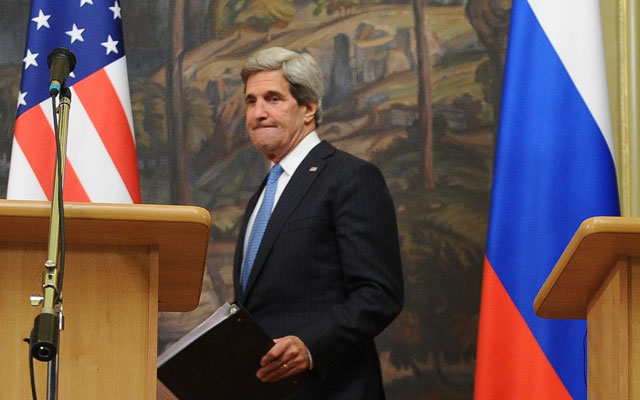Russia: Kerry’s Chilly Kremlin Reception
Ariel Cohen /
This past Tuesday, U.S. Secretary of State John Kerry met President Vladimir Putin of Russia in the Kremlin.
Kerry was seeking to repair frayed ties with Russia and obtain Moscow’s assistance with a settlement in Syria. The U.S. and its allies hope to put an end to the civil war, and the Obama Administration wants Russia to help.
Yet Putin gave Kerry the cold shoulder, and Russia’s help in Syria is unlikely. Russia does not want the West and its Gulf allies to topple the Assad regime. Putin believes Russia got a black eye when it abstained in the United Nations Security Council vote that toppled Muammar Qadhafi. However, Kerry agreed to a peace conference on Syria, which will take place in Geneva—with no preconditions, such as Assad’s departure.
This conference is an achievement for Foreign Minister Sergey Lavrov, who will have a photo-op with Kerry; an achievement for Russia, which will appear as Washington’s equal in the international arena; and an achievement for Kerry, who will boast that he got the parties around the table.
The Obama Administration recognizes that there are problems with its Syria policy, where it finds itself stuck between the repressive Assad regime and Sunni extremists, including al-Qaeda-affiliated Jabha al-Nusrah. However, by agreeing to a Geneva conference with Russian co-sponsorship, Obama gained nothing while providing Moscow with a diplomatic advantage.
Kerry’s meeting with Putin was nightmarish. He was kept waiting for three hours for the master of the Kremlin, contrary to diplomatic protocol. Putin then appeared disinterested, fidgeting with his pen throughout the meeting.
However, Kerry did not want to quarrel. He searched for common ground. He thanked Russia for helping in the investigation of the Boston terrorist attack and stressed that a number of problems can only be solved jointly, including North Korea, Iran, and Syria. Kerry walked around Red Square and talked to the Russian veterans of World War II—that is, he did his best to leave a good impression.
He did it for a reason. Kerry is trying to lay the groundwork for forthcoming meetings of Putin and Obama: at the G-8 summit next month in Northern Ireland and at the G-20 St. Petersburg summit in September. In October, the two leaders will also have an opportunity to hold a bilateral meeting at the margins of the Asia–Pacific Economic Cooperation summit in Indonesia.
There is plenty of negativity between Moscow and Washington today. The poisonous Russian reaction over the “Magnitsky List”—including the law banning U.S. adoptions of Russian orphans, and preposterous charges that the U.S. intervenes in Russian “internal affairs” by supporting the democratic opposition—threatens to put U.S.–Russian ties in deep freeze.
If Kerry’s visit could help change the tone between the two countries and make the dialogue more civil and the relationship more pragmatic, there would be reason to applaud. In today’s world, there are too many threats that are a danger to both Russia and the U.S. However, unilateral concessions and “turning the other cheek” diplomatically will not gain Russia’s respect.

